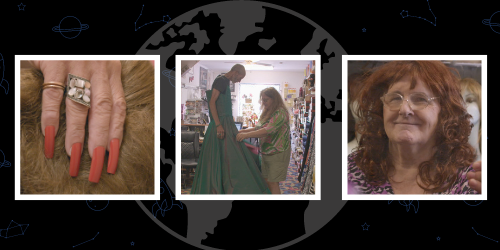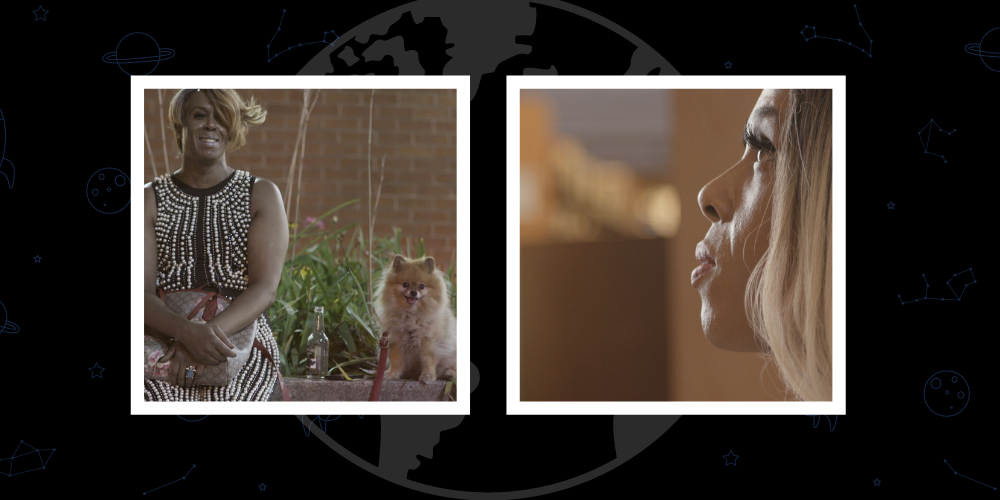Questo mese, il pubblico può schermare Take a Walk on the Wildside on the Planet Classroom Network. This film is curated by Planet Classroom
Delve into the captivating world of Paddy and her unique clothing shop. In this exclusive interview with acclaimed filmmaker Lisa Rideout, we explore the inspiration behind her highly praised documentary, Take a Walk on the Wildside. Through her film, Lisa aims to humanize cross-dressers and shed light on their diverse stories, fostering acceptance and understanding. Discover the distinctive aesthetic and visual style that Lisa employed, capturing genuine moments between Paddy and her customers.
Il Global Ricerca per l'Educazione is pleased to welcome back Lisa Rideout.
Lisa, what inspired you to create a film about Paddy and her unique clothing shop? Did you have personal experience with cross-dressing or gender-bending fashion?
I first visited Wildside in October of 2015. I was scouting the store as a location for a different film shoot. I was drawn to Wildside visually. Every inch of the store was covered in visually intriguing items that had their own story to tell. The first day I visited I remember thinking how strange it was that I did not know about the store. When I started to mention the store to other people, they had the same reaction as me, always saying, “I’ll look out for it next time.” Even though the store had been a pillar in the cross-dressing community for the last thirty years, it seemed many people outside of the community did not know about it. That really solidified my interest in pursuing the film and bringing the story of Wildside to a larger audience.
My personal experience with cross- dressing or gender-bending fashion would have been through friends.
Your film conveys a message about being true to oneself and accepting others for who they are. How did you want viewers to feel after watching the film, and what do you hope they take away from it?
I made this film in 2017 so the landscape of knowledge, understanding of sex, gender and sexuality and media representations have changed and become more inclusive. This needs to be kept in mind while viewing this film. At the time of making the film the intention was that Take a Walk on the Wildside helped humanize cross-dressers. Whenever I mentioned that I was working on this film, I got asked the question, “Why do people cross-dress?” And I always answered that it depended on the person.
My hope was that this film illustrated that cross-dressers were diverse and that showcasing the stories in the film encouraged acceptance.
Your film has a distinct aesthetic and visual style. Can you talk about the decisions you made in terms of cinematography, editing, and music to create that style, and how you wanted it to contribute to the overall message of the film?
The style of the film materialized from the days I spent observing Paddy in the store. I wanted viewers to be able to see those genuine and important moments between Paddy and her customers. Basato su questo, I decided that the best approach stylistically would be an observational-fly on the wall documentary.
The film shows a day in the life of Wildside, from when Paddy opens the store to when she closes it. Four customers come through the store for a variety of reasons. Audiences learn a bit about the customers’ lives through their conversations with Paddy. I think this stylistic approach really showcased the heart of Wildside. I also wanted to reach an audience that would not typically watch a documentary about this topic.
Some of the documentaries that were inspirations were Rich Hill, Above and Below and the short documentary film, Hotel 22. They are all beautiful films that tell important stories through a “fly on the wall” lens.
Some viewers might see the film as simply celebrating and fetishizing cross-dressing, rather than promoting a message of acceptance and inclusivity. How would you respond to that critique, and how did you work to ensure that the film conveyed the right message to its audience?
We did our best to give viewers an understanding of who the customers of Wildside were, within the time constraints of a short film. Stylistically, we wanted to convey emotion and a visual language of acceptance, rather than fulsome backstories. There are plenty of talking heads documentaries that would include more information but that wasn’t our approach. Our process of making this film, as well as the final film, I think promote acceptance and inclusivity.
Thank you Lisa!
C.M. Rubin and Lisa Rideout
Da non perdere Take a Walk on the Wildside, now streaming on the Planet Classroom Network. This film is curated by Planet Classroom.







Commenti recenti